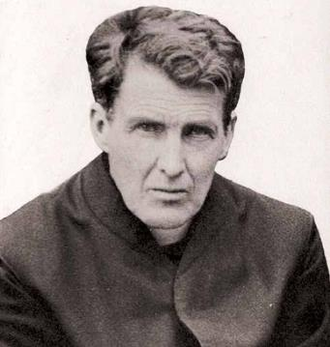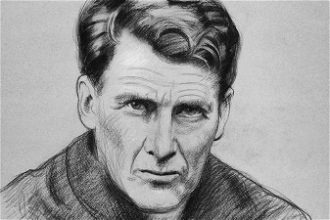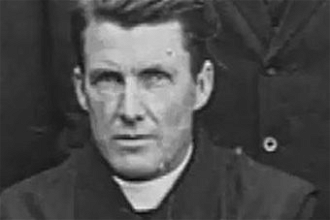Blessed John Sullivan - homily by Fr Conor Harper SJ

Bl John Sullivan SJ
Fr Conor Harper SJ, gave the following homily at Farm Street Church on Sunday, on the eve of the anniversary of the death of Blessed John Sullivan SJ, who died on 19th February 1933. Bl John Sullivan was the first person to be beatified in Ireland. In another first - the ceremony was attended by Catholic and Church of Ireland leaders.
Today is the First Sunday of Lent.
Lent is the time of the year when Christians of all denominations observe a time of prayer and penance in preparation for the great feast of Easter when we celebrate the Resurrection of the Lord.
We are invited to reflect on the great questions of life: the meaning of Life and Death, Mortality and Immortality and what it means to be a Christian in the modern world.
We seek our own answers and it is our own personal search. We examine our manner of living and we seek to be our better selves, reflecting on the words of the prophet Micah: "to act justly, to love tenderly and to walk humbly with our God".
We try to fix our gaze on Jesus Christ who is, for us, the Way, the Truth and the Life.
In this time of Lent the figure of John the Baptist looms large; he is the one who had as his mission: To prepare the Way of the Lord.
In the wonderful Prologue to the Gospel of St. John we are told: "A man came, sent by God, his name was John
This morning I have been invited here to Farm Street to speak of another John -who was also sent by God. Tomorrow, we mark the anniversary of the death of Blessed John Sullivan SJ, who died on 19th February 1933. This John also prepared the way of the Lord.
Who is John Sullivan?
Turning back through some of the pages of history, I would like to share some of the decisive moments of his life.
John Sullivan was born in Dublin on 8th May 1861. His father, the future Lord Chancellor of Ireland
Sir Edward Sullivan was of the Church of Ireland, Anglican tradition. His mother, Lady Bessie Josephine Sullivan was Roman Catholic.
John was baptised in St George's Church in Temple Street, Dublin on 15th June 1861 and was brought up in the Christian tradition of his father. From his earliest years John enjoyed the benefits of a home which radiated warm affection, high culture and sound scholarship.
In 1873 John followed in the footsteps of his brothers and went to Portora Royal School, Enniskillen in Co Fermanagh which had the reputation of being the most eminent Protestant school of the day. He spent happy years at Portora and in later years admitted that he went there "bathed in tears" but when the time came to leave he "wept more plentiful tears".
After Portora, John went to Trinity College, Dublin. He distinguished himself in his university studies and in 1885 he was awarded the Gold Medal in Classics. After gaining a Senior Moderatorship in Classics, John decided to study Law. It was at this time that his father, the Lord Chancellor of Ireland, Sir Edward Sullivan, died suddenly. His death had a devastating effect on John.
The promising young scholar left Ireland and continued his legal studies at Lincoln's Inn, here in London, where he was called to the Bar in 1888.
At this time, due to his inheritance, he was very comfortable in financial terms and was noted for his fashionable dress and handsome appearance. He travelled extensively throughout Europe and was a keen cycling enthusiast. He stayed at the Orthodox monastery of Mount Athos in Greece and was friendly with the monks.
Then, in December 1896, at the age of 35, he made a momentous decision. He was received into the Roman Catholic Church here in Farm Street.
From this time onward a marked change was noted in his manner of living. On returning to the family home in Dublin, he stripped his room of anything that was superfluous, satisfying himself with the simplest of furniture on a carpetless floor. The young man, formerly known for his fashionable dress, contented himself with the plainest of clothes.
He became a regular visitor to Dublin hospitals and convents, where he was a welcome visitor. He had a remarkable gift for putting patients in good humour and showed a special sympathy toward the old, bringing them gifts of snuff and packages of tea and reading for them from religious books.
In September 1900 another dramatic moment occurred. John decided to enter the Society of Jesus. The two years novitiate was followed by studies in philosoph.y in Stonyhurst College in Lancashire.
From the beginning, he was clearly different to other Jesuits. To his new way of life he gave himself completely. All who lived with him could not fail to notice his dedication to prayer and to religious life. Despite his outstanding intellectual gifts, he never paraded his knowledge but was always careful to help others whenever possible.
In 1904 he came to Milltown Park, Dublin, to study theology and he was ordained priest on July 28th 1907. He was then appointed to the staff of Clongowes College, Co Kildare where he was to spend the greater part of his life as a Jesuit.
Father John's reputation for holiness spread rapidly around Clongowes and the neighbourhood. Despite his brilliant mind and academic achievements it was his holiness that was most recognised.
Many revered him as a saint. He prayed constantly - he walked with God continually- he listened to Him and God worked through him. Those who were in need of spiritual or physical healing flocked to Father John and asked his prayers - and strange things happened. The healing power of God seemed to work through him and many were cured.
He was always available to the sick, the poor, anyone in need. The call to serve God in serving those who suffered in any way was a driving force in him for the rest of his life. He was always caring for others - a source of comfort and peace to anyone in trouble. He brought many to God by pointing out the way that leads to the deepest and ultimate peace. He was in constant union with his Maker and cared little for the material things of life. He left everything in order to follow the call of his Lord and Master and he found riches of a different order.
What a contrast with the rich young man of his earlier years.
Father John Sullivan died in the old St Vincent's Nursing Home in Leeson Street, Dublin, a short distance from the Sullivan family home on 19th February 1933.
Father John Sullivan was declared Servant of God in September 1960
Venerable in November 2014
Beatified by Pope Francis - 13th May 2017
Father John Sullivan was beatified on 13th May in the Jesuit Church, Gardiner Street, Dublin.
But this was a beatification with a difference. It was the first beatification ceremony ever to take place in Ireland.
Another major historical moment occurred when the solemn petition for beatification was made in the name of the two Christian traditions that were so special in the life of Father John.
Archbishop Diarmuid Martin was joined in the Solemn Petition by the Church of Ireland/Anglican by Archbishop Michael Jackson.
One of the most remarkable features in recent years has been the coming together of the two Christian traditions in the life of Father John.
One of the most enthusiastic supporters of the Cause for Beatification was the former Church of Ireland Archbishop of Dublin, Dr George Otto Simms. He delighted in insisting that a man's character is usually well set when in his mid- thirties. So we must never forget that John's first steps in holiness would have been in his earlier Christian formation and that, later, the Catholic Church reaped the fruits of that solid foundation!
Here in Farm Street, on this Sunday morning, we give thanks to God for what happened here on 21st December 1896 and for its aftermath.
A man came, sent by God; his name was John.
Read also: ICN 16 May 2017 - First-ever beatification in Ireland www.indcatholicnews.com/news/32582

















